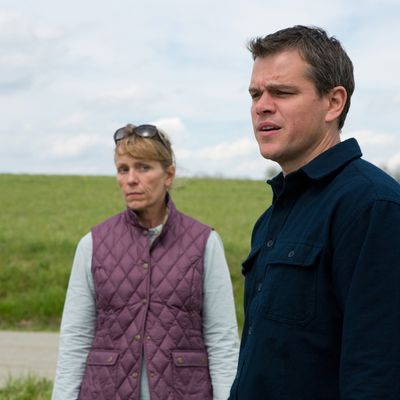
Movies like Promised Land sometimes make me ashamed to be a liberal. Gus Van Sant’s heartland drama about a natural-gas company trying to take over a small town wants to make the personal political and vice versa, to use its protagonist’s indecision and lack of identity to make a broader point about the corporate, “just doing my job” ethos. But it collapses on all fronts, delivering hot-button platitudes and just-add-water character development.
The protagonist in this case is Steve (Matt Damon, who co-scripted, with John Krasinski, from a story by Dave Eggers), who works for a giant energy company seeking to buy drilling rights to the land owned by members of a rural community. He and his partner Sue (Frances McDormand, typically excellent) go into towns, pretend to be down-home types, get people to sign over the rights, and then move on to the next gig. Sue’s got a family back home, and she has a certain matter-of-factness about her job we can call can-do cynicism: As long as she’s able to pay for schools and whatever else, she’ll do what she has to. (The movie should have been about her.) Steve is a bit more of a cipher. We’re not sure what he wants, and neither is he — and that’s kind of the point.
Or it’s supposed to be, at any rate. Promised Land wants to keep the focus on Damon’s (non-)character, but it also wants to preach. Yet its attack on natural gas is so lazy that it actually backfires. When Steve tries to make his case before a group of local citizens, an older man played by Hal Holbrook stands up to challenge him, and we can practically see the halo around Holbrook’s head. Meanwhile, an environmentalist (played by Krasinski) comes into town and just positively charms the pants off everyone while spreading counterevidence that natural-gas drilling, fracking in particular, is in fact quite destructive. (A doozy of a third-act twist tries to complicate the issue with Krasinski’s character, but it actually makes the film’s politics even more one-note than they already were.) The documentary Gasland did a compelling job of explaining to us the potential dangers of fracking, but Promised Land doesn’t show its viewer that kind of respect; it just smugly takes our liberal, anti-natural-gas position as a given. It doesn’t want to have a debate about fracking — which would be fine if it didn’t spend so much damned time on the debate about fracking.
Eggers has in the past cited Bill Forsyth’s charming and understated 1983 fish-out-of-water tale Local Hero as one of his favorite films. His story is probably going for something similar here: The tale of an okay albeit selfish and blank corporate drone who goes to a remote part of the world and, instead of convincing the natives to give up their land, is actually transformed by the experience. But the big, bad corporate meanies in Local Hero were mostly just background (and besides, it wasn’t their politics that Forsyth had issues with, but their self-absorbed alienation), and the focus of the drama was the daily give-and-take of existence in an odd, quaint part of the world. (Forsyth’s film was set in a far corner of Scotland.) Promised Land, however, takes all the wrong lessons from Local Hero. It puts the politics center stage but then refuses to do anything with it. The film is too one-sided to work as a political debate, but too limp to work as agitprop. There’s no debate, no tension, no uncertainty — in other words, nothing to latch onto to keep watching, save for whatever lefty outrage we might choose to bring to the theater with us. It’s all so simple-minded, so cloying that it makes other Van Sant paycheck gigs such as Finding Forrester look like Gravity’s Rainbow.
But the director isn’t exactly sleepwalking here. A couple of lyrical, pseudo-documentary montages that show the townspeople at work display a feel for the folks who live on this land, and there are some nice, natural supporting performances here and there. If this were the old studio system and Van Sant a mostly powerless auteur trying to impose some personality on a script handed down from on high, then we could have given him some points for the film’s more expressive passages. But this isn’t the forties, and Gus Van Sant is one of our major filmmakers. He’s as responsible for the content of his film as he is responsible for any occasional moments of loveliness that might sneak in. And the awkward, shallow obviousness of Promised Land is, frankly, unworthy of his — or anyone else’s — talents.


